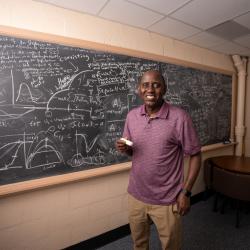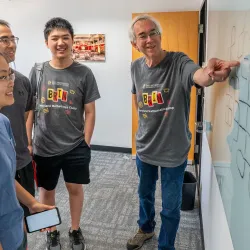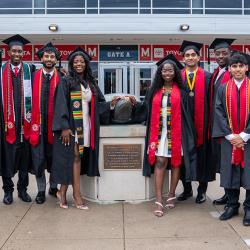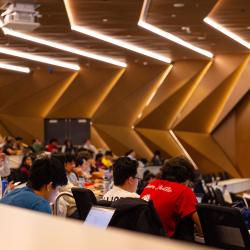Konstantina Trivisa to Continue as Director of UMD’s Institute for Physical Science and Technology
University of Maryland Mathematics Professor Konstantina Trivisa will continue to serve as director of the university’s Institute for Physical Science and Technology (IPST) for four more years, effective July 1, 2021. She served as IPST director for the past year and as associate director from 2014 to 2020.
“I chose Konstantina to be the director of IPST a year ago because she has an outstanding record as an educator and researcher,” said Amitabh Varshney, dean of UMD’s College of Computer, Mathematical, and Natural Sciences. “In just one year, and during a pandemic, she has shown exemplary leadership of IPST, growing and elevating the institute’s educational programs and expanding into new strategic research areas. She also has the enthusiastic support of IPST faculty, staff and students to continue in this leadership role.”
IPST’s mission is to pursue interdisciplinary research and education in emerging areas at the boundaries between physics, chemistry, the mathematical and life sciences, and engineering.
Over the past year as director, Trivisa led the institute in pursuing new research in the emerging area of quantum information science, focusing on IPST’s strengths in applied mathematics, quantum chemistry and quantum thermodynamics. She established interdisciplinary and cross-sector research collaborations with 38 partners from academia, government and industry.
One of these collaborations already produced the first efficient quantum algorithm for dissipative nonlinear differential equations arising in fluid dynamics, plasma physics and epidemiology. The work, which was presented at the 62nd Annual Meeting of the American Physical Society Division of Plasma Physics in November, included researchers from UMD, the Massachusetts Institute of Technology, the Norwegian University of Science and Technology, and Raytheon BBN Technologies.
IPST also organized a Foundations of Quantum Computing bootcamp this summer, in collaboration with UMD’s Science Academy, with attendees from government labs, corporations and universities. In addition, IPST is pursuing joint faculty hires in this emerging area of research with departments in CMNS and the Clark School of Engineering.
“I would like to thank my IPST colleagues, staff and faculty for supporting my leadership this past year and Dean Varshney for his vision for the college,” Trivisa said. “During my term as IPST director, we will pursue significant center funding opportunities to support interdisciplinary research projects of national interest, like quantum information science, and research training grants and fellowships to support students and postdocs. The institute will also expand its collaboration with the UMD Science Academy to create additional training programs for working professionals, including a possible certificate program in quantum information science that builds on this summer’s bootcamp.”
IPST also supports interdisciplinary graduate degree programs at UMD in chemical physics, biophysics and applied mathematics, as well as two National Science Foundation (NSF) funded graduate research training programs: UMD’s node of the international Physics of Living Systems (PoLS) student research network and the Computation and Mathematics for Biological Networks (COMBINE) research traineeship program in network biology. The institute also supports the Burgers Program for Fluid Dynamics and the NCI-UMD Partnership for Integrative Cancer Research.
As IPST director, Trivisa improved efficiencies across the biophysics and chemical physics graduate programs by joining the programs together administratively. Wendell Hill, professor of physics and IPST, will serve as director of both programs, effective July 1, 2021, with members of the recently formed, six-member IPST Graduate Committee serving as program advisors.
In November 2020, IPST hosted its largest Dr. Shih-I Pai Lecture in Fluid Dynamics and Plasma Dynamics ever. Over 350 participants watched virtually as Alán Aspuru-Guzik from the University of Toronto discussed his research on machine learning, quantum computing and automated chemistry.
Trivisa’s own research aims to provide an answer to this fundamental question: Given the complexity of nonlinear systems that arise in physical applications, how can one construct suitable approximating schemes that converge and provide the best approximation of those nonlinear systems? She also works on validating models by connecting theoretical results and simulations with experimental observations. The long-term goal of Trivisa’s research is to construct predictive models that accurately capture the evolution of fluids in various physical regimes or the evolution of cancerous cells and drug efficacy to optimize treatments.
Since joining UMD in 2000 as an assistant professor, Trivisa has won several awards for her research, including a Sloan Research Fellowship, the Presidential Early Career Award for Scientists and Engineers, an NSF Faculty Early Career Development award, and a Simons Foundation Fellowship. She was also selected as an ADVANCE Professor and Leadership Fellow at UMD for her work on issues of diversity and inclusion. She has advised over 20 graduate students and postdoctoral fellows at UMD.
Trivisa has held a joint appointment in IPST since 2008 and in the Center for Scientific Computation and Mathematical Modeling since 2017. She served as director of the Applied Mathematics, and Statistics, and Scientific Computation graduate program from 2007 to 2018. In 2018, she received an Outstanding Director of Graduate Studies award from the university.
She received her bachelor’s degree in mathematics from the University of Patras in Greece in 1990, and her master’s and Ph.D. in applied mathematics from Brown University in 1992 and 1996, respectively.
“I am confident that the interdisciplinary role of IPST and its world-class faculty will keep our college and university at the forefront of scientific discovery and education in the years to come,” Trivisa said.








